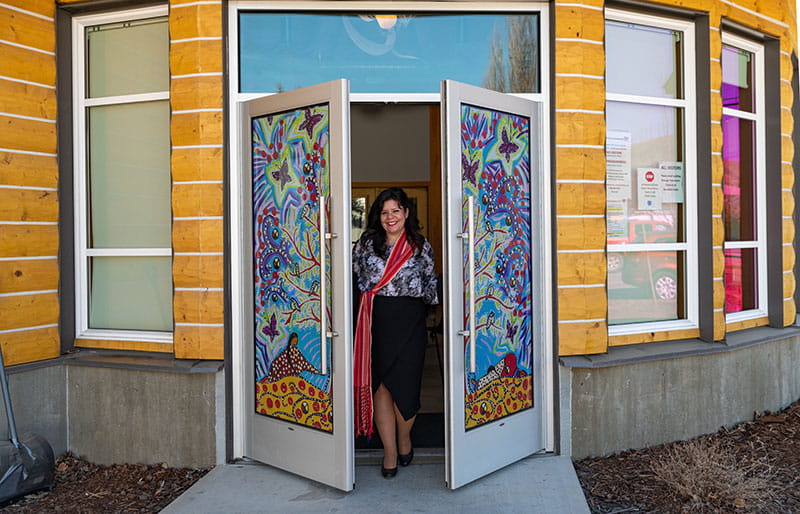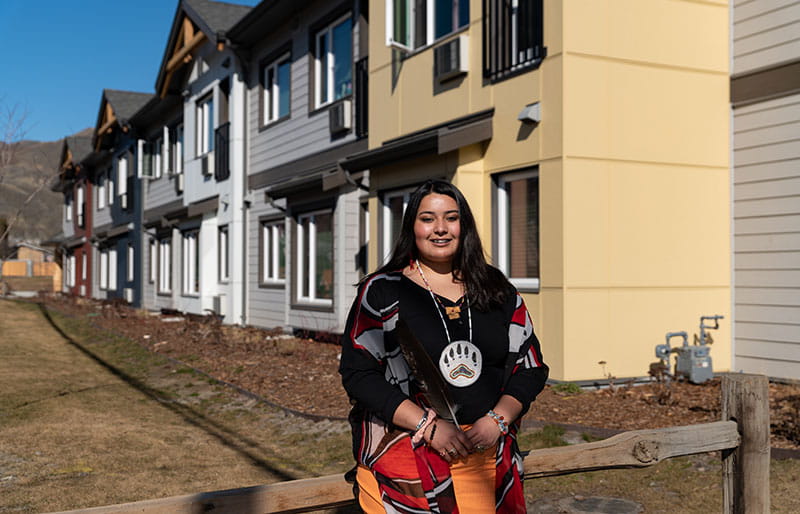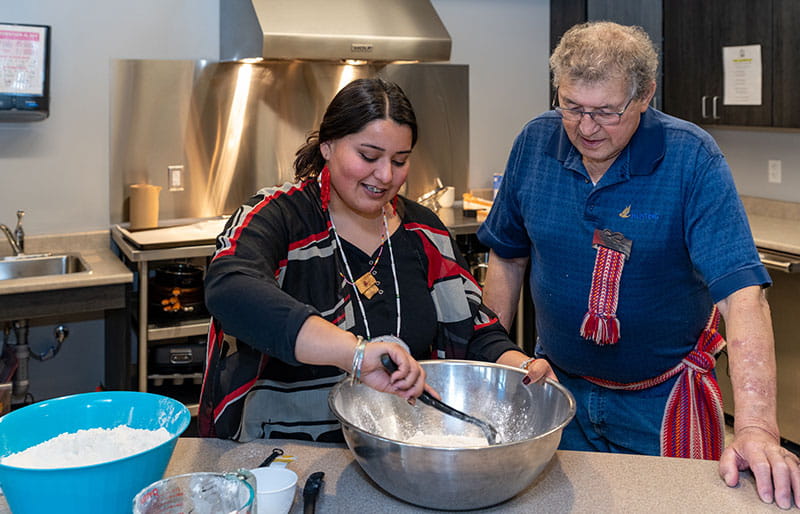Child welfare advocate connects Elders and youth at co-living facility
AT A GLANCE
- Colleen Lucier wants to improve outcomes for Indigenous youth in the child welfare system
- The system is well intentioned, says Colleen, but many Indigenous youth are missing a sense of love and belonging and are disconnected from their cultural identity
- Colleen and her team at Lii Michif Otipemisiwak Family and Community Services have created a first-of-its-kind housing project that aims to fill the gaps in the system by connecting Elders with Indigenous youth

A place of belonging. For many children and youth in British Columbia’s child welfare system this is an unfamiliar concept. Moving from one foster home to the next, when they age out of the system they often have no place to go and no one to turn to. A group in Kamloops is looking to change this narrative.
Kikékyelc: A Place of Belonging opened its doors in late 2020. ‘Kikéyelc’ is a Secwepemc word that means, “to cover young protectively, how mother birds wrap wings around their young.”
The 2-storey building comprises 31 studio and 1-bedroom apartments for Elders and Indigenous youth. It’s a first-of-its-kind project led by Colleen Lucier, executive director, Lii Michif Otipemisiwak Family and Community Services.
Closing the gaps
“The child welfare system in BC is well-intentioned,” says Colleen. “But there are limits, and there are gaps. Many youth who have grown up in the system have been missing a sense of love and belonging for a significant portion of, if not their whole lives. As an Indigenous child in the system, you are often stripped of both your individual and cultural identity.”
Fostering Elder-youth relationships in a co-living environment creates a sense of community.
Colleen and her team at Kikékyelc aim to close these gaps.
“Fostering Elder-youth relationships in a co-living environment creates a sense of community,” she continues. “It also builds a support network for youth. It enables them to connect with their culture, develop their spirituality, sense of purpose and self-confidence.”
Colleen identifies Elders who are motivated to support and guide youth, as well as pass on teachings and traditions that are central to Indigenous culture. She then matches the Elders with youth who she feels will benefit from, and contribute to, the relationship.
A home with social, cultural and emotional supports
When high-school valedictorian Neela aged out of the system, she had nowhere to turn. It was an Elder on LMO’s Elder Council that brought her to Kikékyelc.
“After only just a few months of living here, we’re really beginning to see Neela come into her own,” says Colleen. “She’s begun exploring her spirituality, and the Elders have noticed exponential personal growth during her time at Kikékyelc.”

“I’ve found a true place to call home,” says Neela. “I’m wrapped in all of the social, cultural, spiritual, and emotional support that I need. I’ve found a sense of belonging here... I feel hopeful for my future.”
Some Elders work with the youth while living off-site.
86-year old Fred makes a weekly 180km roundtrip commute from Merritt to spend time with the youth at Kikékyelc. His visits are on hold due to the pandemic but the self-proclaimed “Bannock King” is a force in the kitchen. His lessons on how to make the traditional bread provide an opportunity to reconnect youth with Indigenous culture and tradition.
Fred re-introduced bannock to Neela’s world. “It’s small experiences like these that make this place so special and important,” says Neela. “I’m so pleased to be a part of this.”
Commenting on these unique relationships Colleen says, “they have a powerful, positive impact on youth and go way beyond anything that can be achieved in the current welfare system.”

Re-designing the system
Colleen is always thinking about how the child welfare system can be re-designed and re-shaped. She believes that First Nations and Métis Elders owe their youth the types of supports, love, and secure living environment provided at Kikékyelc.
“When you’re a youth that has never received guidance from parents or Elders, how do you expect to navigate through a world where the cost of living is so untenable?” says Colleen.
Once you’re able to provide this peace and secure housing, you’re able to free their minds to think about things other than just survival.
“What we’re aiming to do here at Kikékyelc is break down the barrier of secure housing for a population that already faces so many barriers. Once you provide this peace and secure housing, you’re able to free their minds to think about things other than just survival. You free their mind, heart, and spirit.”
Colleen views Kikékyelc as a model that should be replicated across the country. She acknowledges that it might feel overwhelming at first — there is no roadmap. But, just one foot in the right direction can set the wheels in motion. She says if your project is honest, good things will follow, it will happen organically. This is what happened for her and her small team at LMO.
“We don’t need any more studies. We need action. We as First Nations and Métis people know better. We know what our children need. We have to be the ones to do it, to be responsible leaders. We have the tools to break the cycle.”
KEY FACTS
- Lii Michif Otipemisiwak Family and Community Services received funding for Kikékyelc: A Place of Belonging, through the National Housing Co-Investment Fund, an initiative of the Government of Canada’s National Housing Strategy.
- Lii Michif Otipemisiwak Family and Community Services is a non-profit organization dedicated to the safety and wellness of Métis children and families.
RELATED ARTICLES

